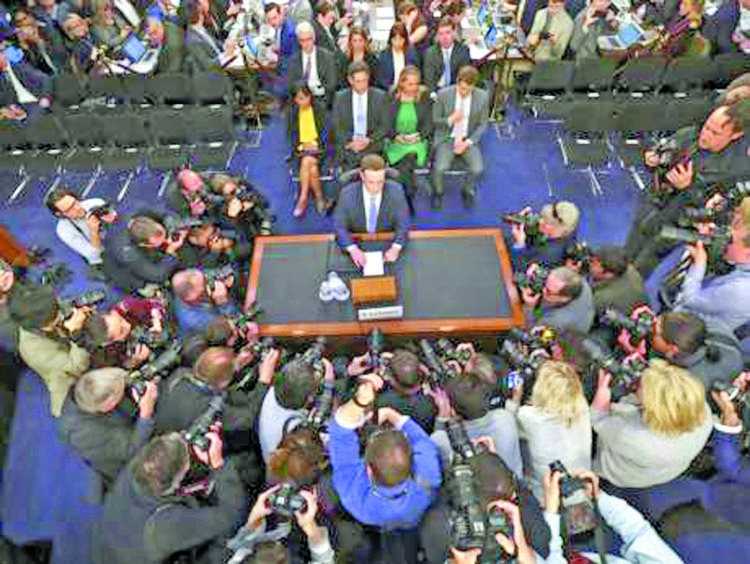Published: 12:57 AM, 20 April 2018
Ousting Zuckerberg from Facebook may not be easy

A lot of people these days think Facebook has become an incorrigible, toxic "regime of one-sided, highly profitable surveillance" under the near-absolute control of a "sovereign and singular ruler", as University of North Carolina information scholar Zeynep Tufekci summed up in Wired a couple of weeks ago.
I'm not sure the harshest Facebook critics are right. I agree, though, that the company is different even from rival miners of user data, such as Google. Google provides discrete services (search, email, maps, etc) in exchange for exploiting what it learns from its users' behaviour to better target ads.
At Facebook, the targeting and the core service seem inseparable. The social network is a "utility", as founder and sovereign ruler Mark Zuckerberg used to tell people before it became clear that this might have negative regulatory implications. It is also, as he once told tech journalist David Kirkpatrick, "more like a government than a traditional company".
This provides an interesting lens through which to view the question that has launched a thousand thinkpieces over the past month: What is to be done about Facebook? Think of the company as a global government ruled by a despot, and the options do seem quite limited.
Facebook's outside shareholders certainly don't have much leverage, with King Mark controlling 59.9 per cent of the corporation's voting shares despite owning less than 16 per cent of shares overall, according to the proxy statement filed last week. Shareholders did revolt against a 2016 Zuckerberg plan to allow him to sell $74 billion (Dh272.17 billion) worth of his Facebook shares without losing control, but they have no means of revolting against current arrangements other than selling their shares - which many can't do, given that it's the fifth-most-valuable company on the Standard & Poor's 500 Index.
Customers also have limited recourse. As Senator Lindsey Graham (Republican, from South Carolina) asked Zuckerberg last week: "If I'm upset with Facebook, what's the equivalent product that I can go sign up for?" Zuckerberg's reply - "the average American uses eight different apps to communicate with their friends and stay in touch with people" - didn't exactly settle the matter.
As Princeton University computer science professor Arvind Narayanan put it on Facebook sort-of-competitor Twitter on Monday: "Governments can of course act to rein in Facebook's behaviour, and last week's congressional hearings are an indication that US authorities are beginning to follow in the footsteps of their peers in the European Union, whose General Data Protection Regulation takes effect in May.
Then again, regulation more often entrenches incumbents than deposes them, and tech analyst Ben Thompson makes a pretty convincing argument (warning: paywall) that while the GDPR will be a hassle for Facebook and Google, it may improve their competitive positions by devastating rival advertising networks that follow internet users from site to site. (Other recent developments in Europe involving privacy laws may pose a bigger threat, though.)"
A different regulatory approach would involve taking on Facebook for its power and size, but while I could envision Facebook being prevented under a more aggressive antitrust enforcement regime from buying more Instagrams and WhatsApps - or even being forced to spin off the ones it already owns - it's hard to envision how the core Facebook network could reasonably be broken up. It is a natural monopoly.
Finally, there are Facebook's employees, until recently a singularly committed, talented group, but now showing signs of discontent. As TechCrunch's Josh Constine put it last month: "It's tough to build if you think you're building a weapon. Especially if you thought you were going to be making helpful tools. The melancholy and malaise set in. People go into rest-and-vest mode, living out their days at Facebook as a sentence not an opportunity. The next killer product Facebook needs a year or two from now might never coalesce."
That, in the end, really gets at the threat to Facebook and Zuckerberg. It's not that the company's current status as the dominant social network or Zuckerberg's absolute control of it is under serious siege; it's that Facebook may find it harder and harder to dominate whatever comes next - as Microsoft did after it became the target of growing public criticism and an antitrust action in the late 1990s. But what if whatever is coming next on the social network front takes a really, really long time to come?
The writer, a former editorial director of Harvard Business Review, has authored "The Myth of the Rational Market"
Source: Bloomberg
-Justin Fox




